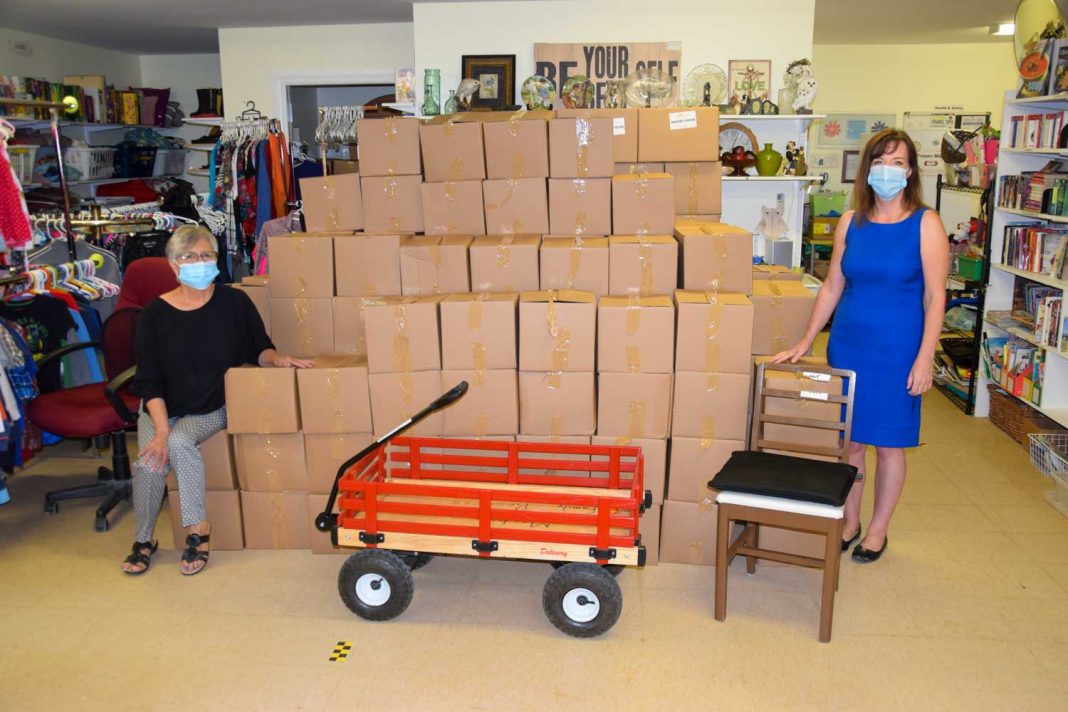MINDEMOYA – Manitoulin Family Resources (MFR) has had to make some tough decisions with the advent of the COVID-19 pandemic, but one of the easier ones has been to repurpose the Help Centre into a much larger food bank. That is because not only has MFR had to stop taking in donations of clothing, books and household items and is unable to let most of its volunteers and clients into the Help Centre, but the demand for emergency food has skyrocketed by as much as 400 to 500 percent during the pandemic.
“When the communities were on lockdown, it was very, very quiet at the beginning,” says MFR executive director Marnie Hall, who provided a tour of the revamped facilities along with MFR food security program co-ordinator Linda Gilchrist. “We reached out to communities to encourage workers to continue to make referrals because we didn’t know. A lot of people were relying on workers to make referrals. The pandemic hit and then workers were working from home and we did not know if they had what they needed. Once Linda was able to make those contacts she would be called and told ‘here is a list of 700 people’.”
Arrangements would be made for pallets to be set outside the Help Centre building and workers would come to pick them up by the vanload, says Ms. Hall.
Meanwhile, with the Thrift Store out of commission during the pandemic, the Food Bank was hit with a perfect storm. “Not only did we not have the revenue coming in from the Thrift Store sales, our main source of income, but demand was rising rapidly,” says Ms. Hall.
Luckily, the federal government stepped up to the plate with a major investment into Food Banks Canada and the Emergency Community Support Fund. The Food Bank was also the recipient of food supplies flowing through a program co-ordinated by Noojmowin Teg’s Child Nutrition Co-ordinator Cody Leeson.
With 10 skids of pre-packaged emergency food boxes arriving, then another six skids shortly thereafter, MFR had to scramble to find room for all those incoming food supplies.
“The Help Centre items have been packed up and are being stored to allow for the food storage area to be expanded,” says Ms. Hall. “We have made a major shift in our operations.”
Where the Help Centre once featured tables and hangers festooned with clothing and household items now stands a massive pile of cardboard boxes filled with non-perishable items. New fridges and freezers have been purchased through additional funds made possible by federal programs.
Part of the $75,000 grant from the Emergency Community Support Program will enable MFR to hire a staff member who will have a wide range of duties, including not only helping to get food and other materials out to those in Island communities who need them, but also work as a technical support person for a digital outreach program.
MFR is purchasing iPads which will be distributed free of charge to seniors, enabling them to access virtual doctor’s appointments and take part in online social gathering events such as paint classes.
The technical support for seniors will ensure that seniors will be able to utilize the iPads to their full potential.
“The person will also be instrumental in working though the Food Bank and Help Centre in getting food, clothing and household items out to where they are needed in the community,” explains Ms. Hall, “doing door drops into the community.”
It will be at least a month before that service is likely to be fully up and running, cautions Ms. Gilchrist. “Our hope is that everything will get going in the next month; it all takes time to get set up.”
Once the Help Centre/Food Bank revamp is complete, it is hoped that pairs of socially-linked volunteers will be able to return to the facility and the intake of donations can resume.
“Items dropped off need to be dated and it has to sit before volunteers can open and sort it,” says Ms. Hall. “The contact delay is to prevent any potential transmission of the virus.”
In the meantime, MFR wants the public to be aware that access to emergency food supplies has not changed materially since the advent of the pandemic. “There is no proof of need or income or anything like that—it is self-referral,” assures Ms. Hall. A simple phone call to the Food Bank will set things in motion. Two boxes of food, one of non-perishables and the other of perishable food items will be set aside, marked with a first name, and put on a table set up outside the food bank. “They just come and pick it up,” said Ms. Gilchrist.
A cadre of drivers are available to take emergency food items out to the more remote and isolated communities and people in need.
Although the funding flowing through from the federal programs has helped immensely during the pandemic, MFR is struggling with a massive drop in revenue from the Thrift Store, so cash donations from the public are highly encouraged.
Emergency food assistance can be accessed by calling 705-368-3400, extension 242.





